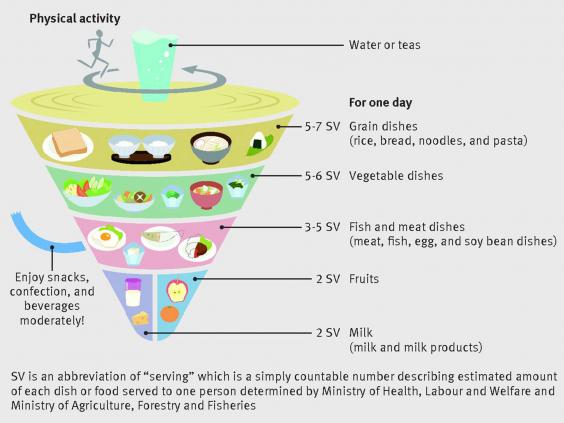It's widely known that the Japanese live long and healthy lives, at least partly thanks to their healthy diet. According to WHO, Japanese women have the highest life expectancy of women across the world 87 , while Japanese men are in the top 10. A study in the British Medical Journal that tracked nearly 80,000 men and women over the course 15 years found that those that followed the Japanese government's 2005 food guide had 15% lower mortality rate.

The Japanese government's official advice on food BMJ
Here are five foods and ingredients commonly found in the Japanese diet that are known to have valuable health properties.
1 Fish
Fish is a fantastic source of omega-3 fatty acids. These fats are not only essential for heart health, but also for our brain and eyes. They are also anti-inflammatory. Inflammation is a characteristic of most chronic disease - from arthritis to heart disease to Alzheimer's - so keeping it under control may be a key factor in maintaining good health into old age. Furthermore, fish is rich in selenium, which is vital for our antioxidant defences and immune system, and B vitamins that help to keep our brain chemistry in balance.
2 Fermented soya
Fermented soya products, such as miso soup and umami paste, contain isoflavones. Isoflavones have a weak oestrogen-like effect in the body - so may be especially helpful for women after menopause, when natural oestrogen levels drop. Consumption of soya isoflavones has been associated with a lower risk of breast cancer and endometrial womb cancer in women after menopause, as well as better bone mineral density and reduced risk of osteoporosis and fracture. They've even been linked to benefits for cardiovascular health, including reduced risk of stroke and heart attack.
Rather than just any soya, the Japanese tend to consume traditional fermented soya foods such as miso, tempeh and natto. One of the benefits of the fermentation process is that the isoflavones are naturally converted into a form that's much easier for the body to use. It also increases the vitamin K2 content, which plays a role in bone health and heart health too. Clearspring sell affordable umami paste, which can be great for adding flavour to food.
3 Seaweed
Seaweed is a true superfood. It's rich in minerals, including iodine, zinc, magnesium, calcium, potassium and dozens of other trace minerals we need for our immune system, antioxidant defences and heart health. Many of us don't get enough of these minerals in our normal diet, even if we eat plenty of vegetables, because the soil they grow in can be depleted.
4 Matcha tea
Matcha is a traditional powdered green tea made from the fresh leaf tips of the tea plant. Green tea - matcha in particular - is high in catechins. These substances are thought to boost our body's antioxidant defences, potentially helping to protect against degenerative conditions such as Alzheimer's disease, heart disease and even cancers. Matcha tea also contains higher amounts of a substance called theanine, which has been found to have a relaxing effect on the mind and may help protect against the negative effects of stress.
5 Pickled vegetables
Traditionally fermented pickled vegetables are a great source of natural probiotics beneficial bacteria . So they can help us digest and absorb the nutrients in the food we eat, which then benefits all areas of our health. And as around 75% of the immune system resides in our gut, improving our gut flora will help us fight against infection and protect against conditions associated with over-activity of the immune system, such as autoimmune diseases.
However, most pickled vegetables you buy in a supermarket or grocery store are not traditionally fermented, just pickled with vinegar or salt and pasteurized to kill off any bacteria and yeasts. So if you want to copy the Japanese with this one, you may need to look into making them yourself!

